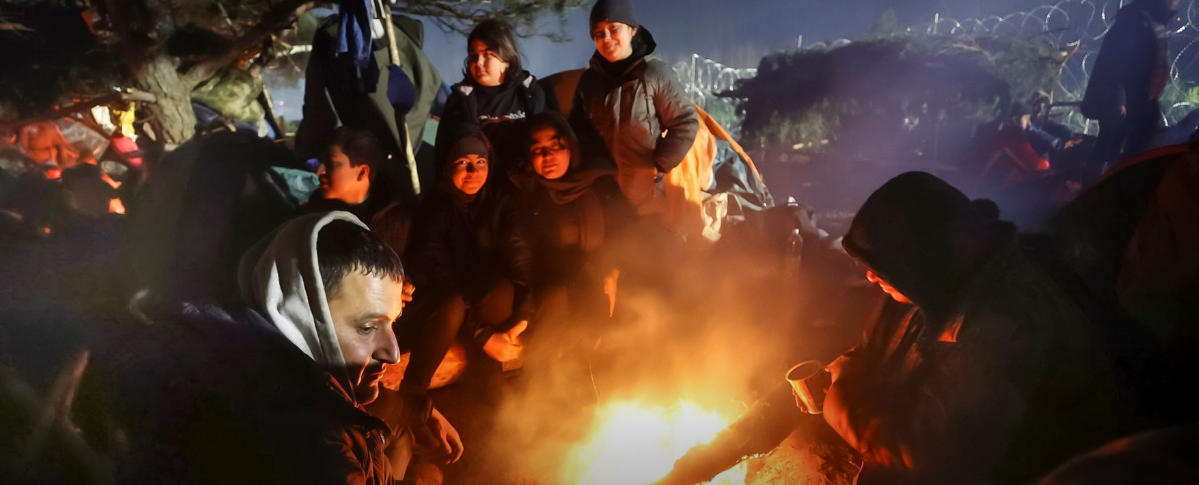A young Syrian man has died at the border between Belarus and Poland, the latest casualty in a monthslong confrontation between the European Union and Belarus’s authoritarian leader, Alexander Lukashenko.
Polish border authorities said Saturday that the body of a young Syrian man around 20 years old was found Friday. The man was found near Wólka Terechowska, a village in northeastern Poland. The exact cause of death wasn’t immediately determined, they said.
Polish border authorities have confirmed the deaths of at least four other migrants since the spring, when thousands of migrants—largely from the Middle East and Africa—started arriving in Belarus and began making their way to the border with Poland, Lithuania and Latvia, hoping to cross into the EU.
Border Group, a humanitarian organization working near the area, said that at least 11 people have died altogether since the spring.
Thousands of desperate migrants are camped in the woods on the Belarus-Poland border, stranded in freezing weather without adequate shelter or food. They have become pawns in a growing clash between Mr. Lukashenko and the EU, which accuses the authoritarian leader of encouraging the people to go the border to provoke a crisis with the West. The past several days have seen a surge of arrivals on Poland’s frontier.
Belarusian authorities didn’t immediately respond to a request for comment on the death of the migrant.
On Saturday, Poland’s border guard accused the Belarusian military of trying to tear down the spools of barbed wire that Poland has used to fence off the border. Massive strobe lights and green laser beams from the Belarusian side blinded Polish security forces, Poland’s border guard said, posting a video of the chaotic encounter.
Authorities in Poland also said Belarus had equipped migrants with tear gas that was used against Polish security forces in an unsuccessful attempt overnight on Friday to break through the barrier.
Belarusian border and interior ministry officials couldn’t immediately be reached for comment.
European officials have accused Mr. Lukashenko of using the migrants in a hybrid attack to pressure the EU over sanctions it has imposed on Minsk, saying that Belarus authorities have lured them into his country and escorted them to the bloc’s border.
The EU is preparing new sanctions against Belarus individuals and entities for the coming days, including blacklisting airlines that are participating in what some officials have described as human trafficking of migrants.
Poland’s Prime Minister Mateusz Morawiecki also blamed Russian President Vladimir Putin, Mr. Lukashenko’s closest ally, as enabling the Belarusian dictator in the latter’s efforts to cause chaos in Europe, a charge the Kremlin called “absolutely irresponsible and unacceptable.”
On Saturday, Mr. Putin said in an interview with Russian state broadcaster Rossiya 24 that Russia had no role in the crisis and criticized those he said were trying to pin the responsibility on Moscow.
He criticized the actions of Polish security forces, who he said were beating the migrants and firing shots over their heads, as inhumane, and called for a diplomatic solution to the crisis.
“I hope that direct contact between the leadership of Belarus and the leaders of the leading countries of the European Union will help resolve these problems,” Mr. Putin said.
Mr. Lukashenko has denied encouraging the migrants to use his country as a transit route to the EU and has blasted the bloc’s refusal to allow the migrants to cross into its territory.
Meanwhile, the crisis has worsened for the 2,000 migrants that Belarus says are currently camped at the border.
Video released by Polish and Belarusian border officials and circulating on social media showed migrants sheltering under flimsy tents or huddled in blankets around wood-burning fires. They include women with small children clutched to their chests in an effort to stay warm.
Belarusian authorities said Saturday that they are attempting to assist the migrants, including providing tents, access to medical care and a generator. Mr. Lukashenko instructed authorities to transport migrant children to care centers. But parents refused to send their children, according to information published on a Belarus state Telegram channel.
On Friday, the International Organization for Migration and the United Nations Refugee Agency said they had delivered some emergency aid, including food and hygienic items for children and women, adding that the Belarusian Red Cross had promised to deliver blankets and warm clothes to the people. The World Food Program found that 60% of the migrants it spoke with on the border of Belarus and Lithuania need some form of medical attention.
As the crisis plays out, many of the migrants have shared tales of desperation. Many paid thousands of dollars—in many cases their life savings—to smugglers on the promise of reaching Europe. They flew to the Belarusian capital, Minsk, from Iraq and Syria, fleeing economic hardships and political persecution, they have said.
Upon arrival in Minsk, many shelled out more cash for taxis to take them to an area near the forest separating Belarus and Poland, where they then trekked for almost a day to reach the border.
They described abuse by Belarusian security forces, including detentions, beatings and extortion. Many migrants said the difficulties weren’t enough to deter them from their goal of reaching Germany.








































admin in: How the Muslim Brotherhood betrayed Saudi Arabia?
Great article with insight ...
https://www.viagrapascherfr.com/achat-sildenafil-pfizer-tarif/ in: Cross-region cooperation between anti-terrorism agencies needed
Hello there, just became aware of your blog through Google, and found ...